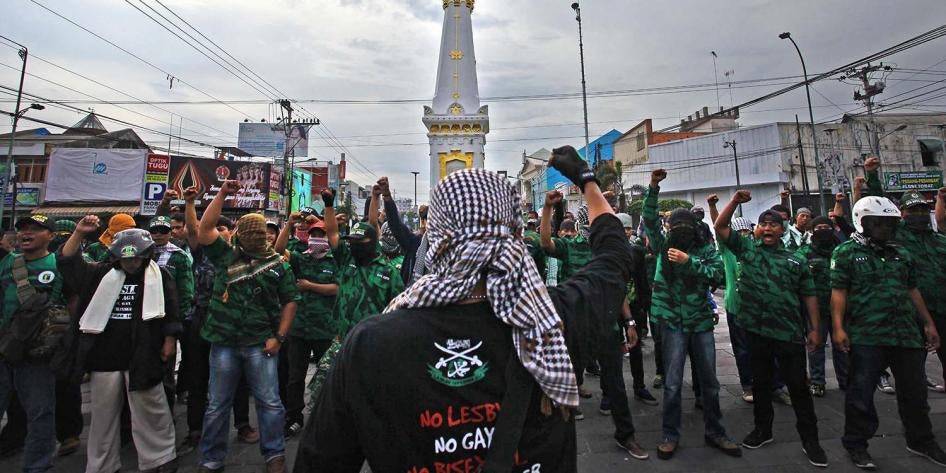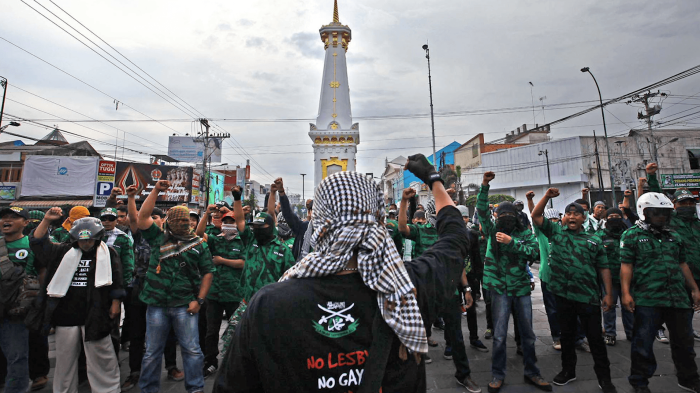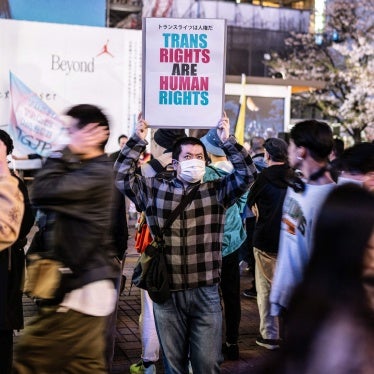(Jakarta) – The Indonesian government stoked an unprecedented attack on the security and rights of sexual and gender minorities in early 2016, Human Rights Watch said in a report released today. The government campaign included hateful rhetoric, discriminatory edicts, and the use of force to repress peaceful assembly.
The 56-page report, “‘These Political Games Ruin Our Lives’: Indonesia’s LGBT Community Under Threat,” documents how officials’ biased and untrue statements about lesbian, gay, bisexual, and transgender (LGBT) people provided social sanction for harassment and violence against LGBT Indonesians, and even death threats by militant Islamists. State institutions, including the National Broadcasting Commission and the National Child Protection Commission, issued censorship directives banning information and broadcasts that portrayed the lives of LGBT people as “normal” as well as so-called “propaganda” about LGBT lives. That combination of discriminatory rhetoric and policy decisions harmed the physical security and right to free expression of LGBT people across the country.
“The discriminatory actions of Indonesian officials and institutions has laid bare the depth and breadth of the government’s prejudice – and the campaign of hate is apparently not over yet,” said Kyle Knight, lesbian, gay, bisexual, and transgender rights researcher at Human Rights Watch and author of the report. “The anti-LGBT rhetoric also exposed the government’s unwillingness to stand between a marginalized minority and its attackers – a most basic failure to protect, similar to Indonesia’s recent record on religious minorities.”
An ongoing Constitutional Court case has been started by a group of professors attempting to change the national criminal code to criminalize consensual adult same-sex sexual behavior, with penalties of up to five years in prison. The next hearing is set for August 23.
The report is based on 70 interviews with Indonesian sexual and gender minorities, LGBT human rights activists, and other civil society representatives across Indonesia between January and June 2016. The series of anti-LGBT remarks began on January 24, when the higher education minister, Muhammad Nasir, said he wanted to ban LGBT student organizations from university campuses. Reacting to the formation of a student-run group that led scholarly discussions on gender and sexuality at the University of Indonesia in Jakarta, Nasir proclaimed that such groups were not “in accordance with the values and morals of Indonesia.”
Within weeks, statements ranging from the absurd to the apocalyptic echoed through Indonesia’s media. At a maternal health seminar, a mayor warned young mothers to teach their children how not to be gay. Ryamizard Ryacudu, the defense minister, labeled LGBT rights activism a proxy war on the nation led by outsiders, more dangerous than a nuclear bomb.
Mainstream mass religious groups such as the Nadhlatul Ulama (NU), the country’s largest Muslim organization and a recipient of foreign aid money to work with LGBT populations, called for criminalization of LGBT behaviors and activism, and forced “rehabilitation” for LGBT people. The Indonesian Psychiatric Association joined the anti-LGBT chorus by proclaiming same-sex sexual orientation and transgender identities “mental illnesses” and recommending psychological “rehabilitation.”
President Joko Widodo’s (or “Jokowi”) government remained mostly silent. In a troubling halfway retraction, the coordinating minister for political, legal, and security affairs, Luhut Pandjaitan, said in February that while he understands homosexuality to be forbidden by religion, “to me LGBT people have human rights as citizens of Indonesia.” But far from genuine reprieve, Pandjaitan went on to warn that “there is no guarantee that any normal family can avoid [having a LGBT child],” and that homosexuality “is a disease of a chromosome, and it should be treated.” A week later, police violently cracked down on a peaceful LGBT solidarity demonstration in Yogyakarta while ignoring death threats toward LGBT groups and people from militant Islamist groups that held counter-demonstrations across town.
“I don’t feel safe with seeing all the ‘end LGBT’ statements on social media,” a 25-year-old gay man in South Sulawesi province told Human Rights Watch. “I feel like a dog. Police and government should protect us – not participate in this.” Indonesia’s National Human Rights Commission said that statements such as Minister Nasir’s are not in line with the Jokowi administration’s Nawa Cita doctrine, which affirms Indonesia’s diversity and pluralism. The last of the nine Nawa Cita principles includes calls for tolerance, diversity education, and creation of space for dialogue among citizens.
Though a number of local by-laws are discriminatory against LGBT people, Indonesia’s national laws have never criminalized homosexuality, but the Constitutional Court case aims to change that. At the hearing scheduled for August 23, the chairman of the National Child Protection Commission is expected to appear. Given that his office has made anti-LGBT statements over the course of this recent homophobic campaign, it is unclear what role the chairman will play at the hearing and if he will reflect that his mandate is to protect all of Indonesia’s children without discrimination.
Indonesia has also failed to enact specific legal protections on the basis of sexual orientation and gender identity, leaving LGBT people vulnerable to abuse and discrimination without recourse.
The government should immediately and publicly condemn discriminatory statements by public officials and state commissions, and uphold nondiscrimination in its health, public information, and public security operations.
“At a time when LGBT Indonesians needed protection and public support, Jokowi’s government has cowered in the face of militant Islamists,” Knight said. “The government needs to demonstrate its commitment to protecting citizens from violence and discrimination by rolling back discriminatory decrees, rejecting anti-LGBT legislation proposals, and pledging public support for free expression and diversity.”











